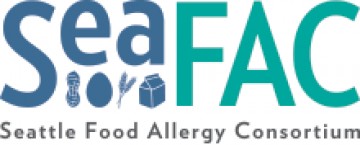The Seattle Food Allergy Consortium (SeaFAC) Issues New Allergist Guidelines For Parents on Early Introduction of Peanuts to Help Prevent Peanut Allergy

Seattle, WA, May 11, 2015 (Newswire.com) - After years of allergists recommending that parents delay introducing peanuts in an attempt to prevent peanut allergy, the February 2015 LEAP Study results found that “careful” early introduction of allergens could reduce the chance of developing the allergy in certain high-risk kids. To summarize, the study found 13.7 percent of qualified children asked to avoid peanut for 5 years developed a peanut allergy versus only 1.9 percent of kids that added peanut to their diet before their first birthday. These findings offer a complete reversal of conventional thinking, opening up the possibility of parents introducing peanut into the child’s diet before age 12 months, as a preventative treatment for peanut allergy.
“This has been an amazing year for food allergy prevention and treatment research. Although there is currently no cure for food allergies, we’ve learned more this year than we have in the last 15 to 20 years,” according to Dr. Stephen Tilles, Executive Director of ASTHMA Inc. and Executive Committee member for the Seattle Food Allergy Consortium (SeaFAC). “The SeaFAC Executive Committee felt the game-changing nature of LEAP study created a leadership moment for our organization and called for us to create a tool to educate parents on how and when to introduce peanuts into their child’s diet early.”
The LEAP study findings strongly suggest pediatricians and parents need to change course and evaluate the benefit of “careful” early introduction of peanuts, on a case-by-case basis. To help with this process, SeaFAC has issued a new set of parent guidelines to discuss with their pediatrician (http://www.seafac.org/interpreting-leap-study-results-seafac-guidelines-for-early-introduction-of-peanut-in-high-risk-infants/), based on recently issued recommendations to the allergist community because of the LEAP study.
In part, SeaFAC recommends infants between age 4-11 months old with moderate to severe eczema (persistent rash affecting greater than 75% of skin), a food allergy (e.g. egg or milk) and/or a family history of significant food allergy, should go to an allergy specialist for peanut skin testing and a possible oral challenge. After allergy testing, infants with a negative peanut skin test should begin eating peanuts regularly in order to help prevent peanut allergy. Infants with a strongly positive peanut skin test should continue avoiding peanut until further guidelines are available. Infants with a borderline or low positive skin test may be eligible for careful graded challenge to peanut in the allergy clinic.
The LEAP study did not include infants without strong risk factors for peanut allergy, though based on the available evidence, the SeaFAC Executive Committee recommends early introduction of peanuts even for low-risk infants. Peanut protein is inexpensive and generally safe if introduced to infants in a form other than whole peanuts (e.g. 2 teaspoons of smooth peanut butter mixed with mashed banana). It’s unknown whether early introduction of tree nuts, seeds, or other allergenic foods is beneficial.
“SeaFAC issued the guidelines because we wanted to give parents useful information about introducing peanut into their infant’s diet based on the new findings from the LEAP study,” notes Mary Farrington, an allergy specialist at Virginia Mason and SeaFAC Executive Committee. “Again, infants at high-risk for peanut allergy are advised by SeaFAC to seek the guidance of a trained allergist before making any dietary changes.”
The National Institute of Health estimates 3 out of every 500 people in the United States are allergic to peanuts. Peanuts are also one of the most common foods to cause allergic reactions in both children and adults, with some reactions resulting in death.
Ongoing, SeaFAC continues to help drive the area’s first desensitization clinical trials, funds its own members’ research to increase our understanding of the mechanisms that cause food allergy, and financially supports allergist training and research advancement at the University of Washington.
About SeaFAC
The vision of the Seattle Food Allergy Consortium (SeaFAC) is to combine research and education resources in the Seattle community to find a cure for food allergy, a rapidly increasing public health problem. Our member institutions include ASTHMA, Inc. Clinical Research Center/Northwest Allergy & Asthma Center, Benaroya Research Institute/ Virginia Mason, Seattle Children’s Hospital/ Seattle Children’s Research Institute, and UW Medicine. By combining Seattle-area resources, including outstanding basic and translational research in food allergy, pediatric/adult clinical research centers and an allergy/immunology training program, SeaFAC will create a world-class food allergy center locally. Together, the consortium will be very competitive in the federal and non-federal funding environment and bring together leading clinicians, researchers and educators to revolutionize food allergy care and research. For more information on SeaFAC, please visit www.SeaFAC.org
Asthma Inc Clinical Research Center: www.asthmainc.org
Northwest Asthma & Allergy: www.nwasthma.com
Benaroya Research Institute: www.benaroyaresearch.org
Virginia Mason Medical Center: www.virginiamason.org/allergy
Seattle Children’s Hospital: www.seattlechildrens.org
Seattle Children’s Research Institute: www.seattlechildrens.org/research
UW Medicine: www.uwmedicine.org and www.immunology.washington.edu
###
Contact
Tina Berryessa
Asthma, Inc.
206.528.4725l
tberryessa@asthmainc.org
Lisa Geschke Sawyer
SeaFAC PR Manager
206-940-2237
lisagsawyer@hotmail.com